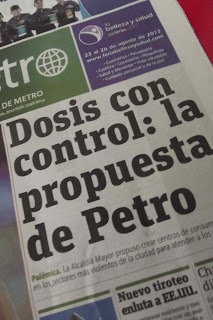 |
| Jeyson and Carlos, on Martyrs Plaza, said they've been using bazuco and living on the street for about six years. |
But the idea of such locations, where addicts can find what they crave in a healthier environment, as well as recieve other kinds of support, is used in Canada, Denmark, Switzerland and other places, and presumably works, since they've continued the policy.
 |
| Andres says addicts should have to work for their fix. |
I talked to Andres, an acquaintance who lives in La Candelaria and said he consumes marijuana and bazuco, a cheap and poisonous form of cocaine "but much less than I used to."
 |
| Addicts wander near El Bronx. |
Andres opined that support centers could improve the lives of addicts and also reduce crime. He suggested that addicts should have to contribute something in return for recieving their fix - such as cleaning up the street.
"If they know that 'I'll sweep these two blocks and then get my vice,' then they'll be less likely to steal," Andres predicted.
 |
| 'Drug Doses With Control.' |
If they receive free drugs, "the addicts will just sink deeper," he said.
But he agreed that if the program were combined with rehabilitation, it could be positive.
 |
| A homeless man smokes something in the Santa Fe neighborhood. |
The mayor's idea and the reactions to it are also indicative of Colombia's contradictory, even schizoid drug policies. While I talked to the officer, a few feet away other cops frisked young men for drugs - even tho the Supreme Court recently ruled that carrying and using a 'personal drug dosis' was a constitutional right, and even Pres. Santos has said that drug decriminalization is worth considering. But, to my question, the officer replied that the police did not recognize any such right. Yet, a few blocks away at a hip hop concert in Tercer Milenio Park young people were openly smoking pot.
 |
| Alcoholics drinking on San Victorino Plaza. The couple kissing alongside aren't paying attention. |
 |
| Homeless men sift thru trash on Calle 13. Most homeless people seem to be addicted to bazuco. |
 |
| Sleeping it off on San Victorino Plaza. |
 |
| Men bathe in the Eje Ambiental's pools in La Candelaria. |






2 comments:
Good post, I like the shots.
M. Forero.
steps to overcome drug addiction
quotes for recovery addicts
Post a Comment